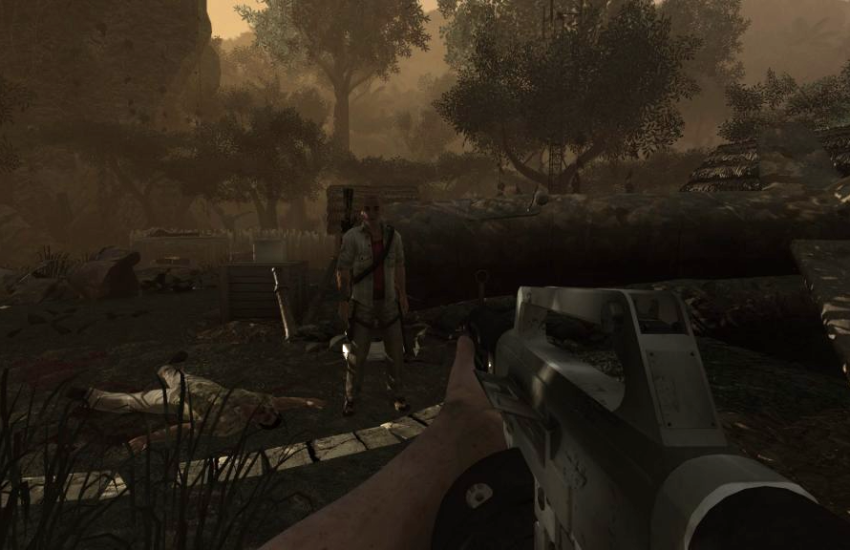As I emerge from the jungle into the clearing, I’m unpleasantly surprised to see Xianyong.
I don’t know him that well. I did a favor for him a while back, he saved my ass during the pipeline job. We’re on decent terms with each other, but that’s it. So what’s he doing here, standing over the body of the arms dealer and the case of diamonds I was supposed to collect from him?
He’s saying something. Telling me not to run, that I wouldn’t get far. Then I hear a much more familiar voice: “Just shoot him…”
Stepping out from behind the arms dealer’s plane, it’s Warren Clyde, my old “buddy”.
Way back when I first landed a role in this shitshow I’d saved him from some shack the APR had him tied up in, and so began our dysfunctional friendship. He was a loose canon, a psycho who always seemed to know when I had a job and always had some elaborate suggestion for a different approach to it. An approach that was inevitably more beneficial to him than to me.
I don’t know why I went along with the guy. I guess I’m a thrill seeker, or I’ve got a death wish… come to think of it that seems pretty obvious.
Last time I’d seen him was his last death defying scheme to make a buck off my work. He’d been ambushed, surrounded in a narrow pass. They’d dropped a tree across the road. I fought like hell to get to him, but by the time I reached him he was already down, writhing on the ground and begging for help.
Compelled again by who-knows-what, I ran off to find something to patch him up with. When I came back he was gone; no trace of him. As far as I knew that was the last I was ever going to see of Warren Clyde.
But now here he was, ordering a mutual acquaintance to gun me down for the diamonds I’d been sent to collect. I’m not offended. It’s perfectly consistent with his character, or lack thereof. Besides, let he who hasn’t screwed someone over for a payday cast the first stone.
No hard feelings, Warren. But I’m not leaving without the diamonds. And this time I’m making sure you don’t get back up.
The plot of the above narrative nugget was not plotted by anyone. I just wrote down some of the things that happened during my playthrough of Far Cry 2 in the voice of the protagonist. It was a collaboration, of sorts, between an amateur writer (me), a gamer (also me), and a simulation.
All things considered I’m pretty pleased with it, if I do say so myself.
This sort of narrative moment is actually what Far Cry 2 was designed to produce, according to the game’s creative director Clint Hocking in a postmortem from 2009 when he said: “…in a very real sense, we had not written a “story”—we had written the elements required to support a dynamic narrative…“
But, that dynamic narrative generator only did part of the work. I had to do some clever editing. If you’ve played Far Cry 2 you might know where I’m going with this.
The reason Warren “…always seemed to know when I had a job, and always had some elaborate suggestion for a different approach…” is because he did. Every single time. And after he disappeared, the “best buddy” that replaced him did the same thing. It’s part of the game mechanics. Your best buddy will offer you an alternative series of objectives in addition to the primary objective of every main mission. Completing these extra objectives for your buddy increases your “history” with them, gets you certain in-game benefits, and happens to always end with fighting off a bunch of enemies that are attacking them.
If I tried to write a story with that it in, a story where the same kind of event kept happening like clockwork and repeatedly, sometimes with different people, it would be unbelievable, repetitive, and frankly surreal.
But, I’d like to suggest it would be wrong to call this a fault in the game design, or to say improvement is obviously in the direction of programming a system that more effectively curates the kind of stories we’d expect in film, stage, or written fiction.
I suggest, instead, that game developers and game players should consider the narrative language of computer games to be unique and different from these other narrative languages, and that we should work together to recognize potential strengths and weaknesses and play to the strengths of the medium.
The general outline of my proposal for this narrative language is this: A computer game does not primarily tell a story. A computer game “simulates”, for lack of a better word, some limited set of actions and events in gameplay. The story, or stories, in a game are told by the designers, or the player, by tracing the connections between related events and making a story out of them.
This is how people tell stories about their real lives. They relate relevant actions and consequences; relevant to whatever their story is about. They certainly don’t relate everything they did, let alone everything that happened.
How this applies to writing, appreciating, and critiquing narrative in games will be the subject of my next post.
